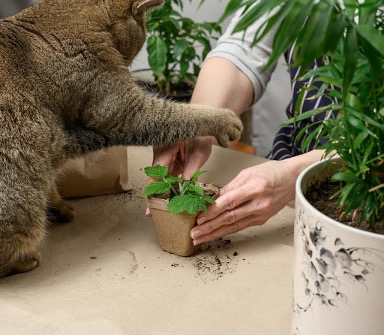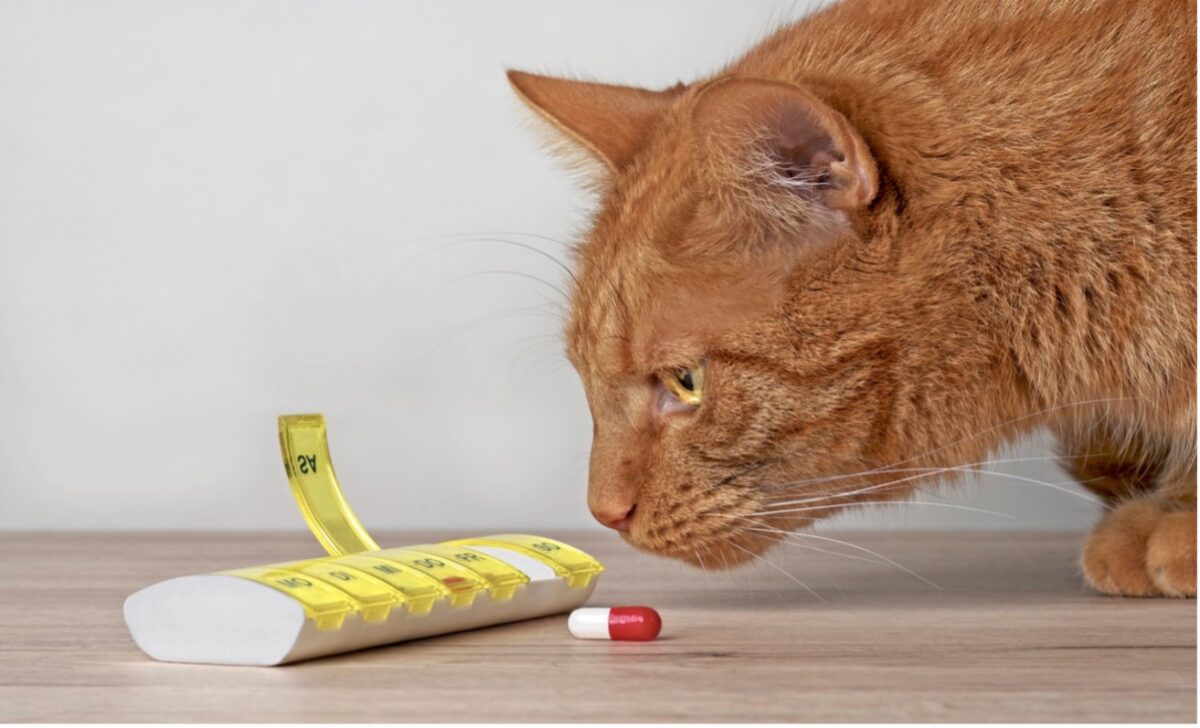Many toxins can harm your pet if ingested, from foods like chocolate and grapes to medications or even everyday household plants. Here is our guide on preventing both indoor and outdoor pet poisons from harming your pet.
Identify Basic Household Pet Poisons
It’s essential to be aware of potential poisons in your home, like cleaning solutions, medications such as painkillers, blood thinners, antihistamines, etc., and vitamins that can be very dangerous for your pet. Please do not keep them in areas accessible by animals, such as tabletops, shelves, or countertops. Make sure all bottles are labeled correctly and store any potentially hazardous items where your pets cannot get at them.
If you have a clever pet that can open cupboards, you can put child locks on the cupboard doors to keep your pet safe. There is also a product by PetSafe called Sscat that you can use to deter and train cats to stay off countertops.
Here are some of the common household products that are poisonous to pets:
- Cleaning solutions
- Pest control products: Pest control products can be lethal to pets. Before purchasing or using any pest control products, read the directions and safety use notes.
- Medications
- Painkillers
- Heart medications
- Anti-psychotic drugs
- Antihistamines
- NSAIDS: non-steroidal anti-inflammatory drugs
- Vitamins: Vitamins intended for humans can be toxic to pets if eaten in large amounts.
- Chewable vitamins can be flavored with xylitol.
- Too much vitamin D can result in a very elevated calcium level in your pet’s body, resulting in secondary kidney failure.
- Prenatal vitamins often contain higher levels of iron, which can result in severe vomiting, diarrhea, and even organ damage and failure.
- Too much calcium in a pet can lead to weakness, listlessness, increased drinking and urination, and loss of appetite.
Never Leave Food Open and Unattended
Pets are notorious for getting into the darndest things. Animals are curious and sometimes the most interesting thing they find is something from your counter, floor, or garbage. Make sure that any food items left out on a countertop or in the open are inaccessible to your animal. Keep lids firmly secured, put away tempting foods like fruit, nuts, and sweets. Here are the top foods that cause the most pet deaths:
- Coffee, Chocolate, Caffeine
- Xylitol
- Onions, Chives, Garlic, and Leaks
- Grapes, raisins, sultanas, currants
- Alcohol
Secure All Dangerous Chemicals, Medicines, and Products
When shopping for products for your pet, be sure to purchase only those products approved or prescribed for your pet.
Although some of the same medications we use can be effective in treating animals, the doses for animals are different and must be precise to the pet’s species, age, weight, etc. When the dosage is wrong or used on an animal without a prescription, it can be fatal for the pet. The same is true for pest control products such as flea and tick prevention products. Never use such products intended for one animal on another animal without checking with us first. When you must use a tick or flea control product on your pet, choose one specifically formulated for your pet and follow the instructions carefully.
Always secure all household chemicals and other hazardous materials out of the reach of pets!
Indoor Plants Can Be Pet Poisons
It is nice to decorate your home indoors with houseplants and flowers. There are many you can choose from that are safe for pets. However, you must check if a plant is safe for your pet before bringing it into your home or keep plants poisonous to pets safely out of their reach. In addition to the plants named above, here are some common poisonous indoor plants:
- Poinsettias
- Aloe Vera
- Corn Plant
- Aloe Plant
- Jade Plant
- Caladium or “Elephant Ear”
- Dieffenbachia or “Dumb Cane”
- Asparagus Fern
Inspect Outdoor Areas Before Letting Pets Enter
Inspect your outdoor areas and remove any potential hazards before allowing them to roam. Check for yard chemicals such as fertilizers, rocks, plants, mulch, and anything else your pet could explore. Also, watch for animals that pose a danger to pets – snakes, spiders (black widow and brown recluse), and other pests are possible threats. You can call a professional pest control service to remove the problem from your yard if necessary. But let the professional know you have pets and ask them about the toxicity to pets of the products they use.

In our blog, Plant a Pet-Friendly Garden, we provide safe choices for mulches, weed killer, snail and slug control. The blog also gives some details about poisonous plants. But, here are the list of common yard plants that are poisonous to pets.
- Sego Palm
- Castor bean or castor oil plant
- Cyclamen
- Dumbcane
- Hemlock
- English Ivy, both leaves and berries
- Mistletoe
- Oleander
- Thorn apple or jimsonweed
- Bulb plants such as tulips, daffodils, irises, lilies, and hyacinths
Beware of Antifreeze
Sadly, pets tend to be attracted to the taste of antifreeze. It is fatal for pets if ingested and they are not treated immediately. So, watch for spills or leaks from your car and clean them up immediately. Kitty litter, sand, or baking soda all work well to absorb the spill and should be used to cover the spill as soon as it happens. Let the substance sit on the spill for 1 to 3 hours. These absorbent materials pick up the antifreeze before it settles. After you clean up the absorbent material, scrub the area with laundry or dish detergent, then rinse everything away with water. Then dry the area with paper towels or a rag.
Know the Signs of Pet Poisoning
As a pet owner, you want to keep yourself informed so you can tell as rapidly as possible if your furry friend needs medical attention. These are some of the common things to watch out for:
- Vomiting
- Diarrhea
- Lethargy
- Irregular/stumbling gait
- Lack of appetite or water intake
- Seizures
- Trouble breathing: wheezing, shortness of breath, slowed breathing, and difficulty breathing. You may also see the gums turn blue in color.
This is not a full list, of symptoms, but if you observe any of these indicators, you should act as quickly as possible because the faster you get help, the better the chances are that there will be no long-term adverse effects for your loved one. You can get more information about pet poisoning from PetPoisonHelpline.com.
Final Words
Knowing the above poisons and keeping your pet safe from them will help your pet live a long and happy life. Any effort you have to put into safeguarding your pet is well worth the peace of mind you will have, knowing that your pet is safe.
If you have any questions or need to schedule an appointment, please contact us. We are here to give your furry family members compassionate care.
Your Friendly Team at
Hammond Veterinary Hospital

